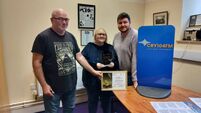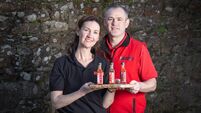People lose weight without cutting calories on UCC diet

Jens Waler, a University College Cork Professor and a PI at APC Microbiome Ireland, a Research Ireland centre, with co-author Joao Filipe Mota, who are part of an international team of scientists that have published a new study published in Cell showing how a ‘Non-Industrialized’ Style Diet Can Improve Gut Microbiome Function and Reduce Risk of Chronic Disease.
A newly-developed diet, inspired by the eating habits of non-industrialised societies, can significantly reduce the risk of a number of chronic diseases such as heart disease, obesity and diabetes.
That’s the finding of research led by Professor Jens Walter at UCC, who is also a principal investigator at APC Microbiome Ireland, at the university.
In a paper published in the prestigious scientific journal, Cell, the new diet, ‘NiMe’ (Non-industrialised Microbiome Restore), mimicking the eating habits of people in rural Papua New Guinea, revealed exciting results.
The diet promotes weight loss, decreased bad cholesterol by 17%, reduced blood sugar by 6% and reduced C-reactive Protein (a marker of inflammation and heart disease) by 14%.
These improvements were linked to beneficial changes in the participants’ gut microbiome, which is home to trillions of bacteria that play a vital role in our health, influencing digestion, immunity and metabolism.
The human trial was performed at the University of Alberta in Canada, Professor Walter’s previous institution.
He explained: “Industrialisation has drastically impacted our gut microbiome, likely increasing the risk of chronic diseases.”
In the strictly controlled human trial, participants followed the NiMe diet and consumed L.reuteri, a beneficial bacteria prevalent in the gut of Papua New Guineans but rarely found in industrialised microbiomes. The diet enhanced short-term persistence of L. reuteri in the gut.
Although participants did not consume fewer calories on the NiMe diet, they lost weight and the diet led to considerable cardiometabolic benefits.
So what can be eaten on the NiMe diet?
It has a plant-based focus but it’s not a vegetarian diet. It’s primarily made up of vegetables, legumes and other whole-food plants. One small serving of animal protein per day is allowed (salmon, chicken or pork.) No dairy, beef or wheat are allowed. These are excluded simply because they are not part of the traditional foods consumed by rural Papua New Guineans.
The diet is very low in processed foods that are high in sugar and saturated fat. This fibre-rich diet is 22 grams of fibre per 1,000 calories – exceeding current dietary recommendations.
Do Papua New Guineans live longer than people in industrialised societies?
“They do not live longer. Industrialisation and modernisation lead to food security, antibiotics and low infant mortality. But in Papua New Guinea and other similar populations, they have a lot of infections and a lot of pathogens. Their water system is less good than in industrialised populations and their food security is less safe.”
However, the western diet, while safe (in terms of food security) can make us sick because of “not so good nutrients. We have exchanged infectious diseases with chronic diseases. These chronic diseases are extremely low in rural Papua New Guinea. There is very little type 2 diabetes and very little multiple sclerosis there.”
Professor Walter says he is inspired by a famous Irish scientist called Denis Burkitt, the father of dietary fibre. “He did research in the 1960s having worked as a doctor in Africa. He recognised in African populations that they eat a lot of dietary fibre. And things like colon cancer are less in the non-industrialised world than in the modern world.
“This is really relevant because there has been a recent spike in colon cancer among young people. This has something to do with the recent shifts in dietary trends which are really not good for the microbiome and can cause colon cancer.”
It is said that about 60% of food in supermarkets is ultra processed.
“I’m very negative about ultra processed food, such as foods with a huge amount of sugar. I’m also quite negative about foods with an extremely high level of saturated animal fat.”
Also under discussion at the moment is the fact that, traditionally, our food was more whole food. Bread would have been made with whole grains. With industrialisation, a lot of food is made with white flour (which has low dietary fibre.)
“There are food products that are full of refined carbohydrates which can lead to really high insulin level spikes. Obesity is skyrocketing. In the U.S, it’s considered essentially a medical emergency. It’s not an over-statement to say that many aspects of modern diets are detrimental to health.”
However, the NiMe diet could be said to be very restrictive with, for example, no dairy consumed.
“They don’t consume dairy in Papua New Guinea. I would not recommend the strict absence of dairy. Have a little bit. I don’t believe in diets that exclude things.
“What I believe is that you have to eat 95% healthily. You have to increase whole plant foods and vegetables to 85%. You need to improve the quality of your protein by consuming legumes, nuts and fish. Limit the amount of processed food and high fat dairy.”
Professor Walter says that despite all the recommendations, “it’s very hard to get people to eat healthily. I find it hard myself. We are our own worst enemy.”
Why is it so difficult to eat healthily?
“It’s because we are too busy. We have no time for cooking. We crave processed food.” Professor Walter hopes that the study will result in ideas as to how processed food can be made to be healthier.
He believes that a small amount of alcohol “is actually healthy because it improves your heart. I think red wine is healthier than other drinks.”
With two children, aged four and two, Professor Walter admits that when he brings them out to eat, they typically want chicken nuggets and chips.
“I put something on Twitter giving healthy eating advice for children. I told my eldest child, when he was three, that there are very many little animals in his tummy that make you healthy or sick. The little animals really like porridge and vegetables such as broccoli, and fruit.”
Professor Walter’s son still likes his sweets and cheeseburgers. “But he loves broccoli and olives and pickles. So there is some hope.”
Recipes from the NiMe diet are on Instagram ( @nimediet) and Facebook and will also be included in an online cookbook soon.







 App?
App?





